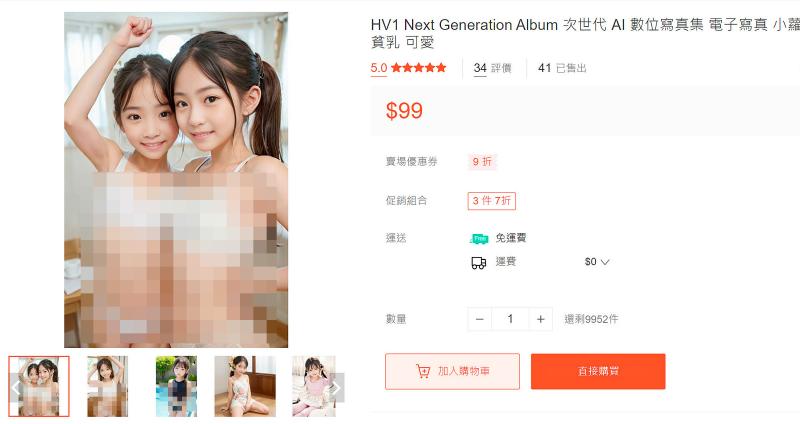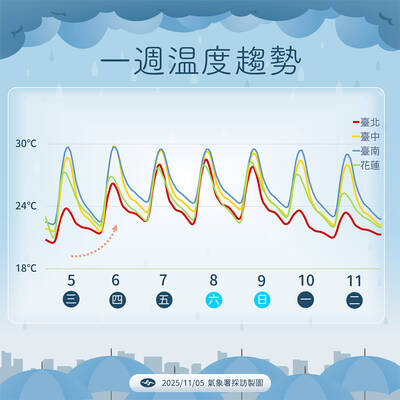With artificial intelligence (AI)-generated content becoming popular globally, AI-generated digital photo albums with child pornography content have allegedly been found on the largest online e-commerce platform in Taiwan, prompting academics and civic groups to urge the sellers to remove the illegal content.
Several AI-generated pornographic digital photo albums were allegedly found being sold on Shopee (樂購蝦皮), an e-commerce platform, and some of these albums included keywords such as “little girl” or “junior-high school student” on the title, and AI-generated and pixelated images of naked underage girls.
One of the alleged AI-generated pornographic album sellers, based in Chiayi City, sells more than 100 uncensored full nudity photos with the product details section saying: “Japanese-style junior-high school students.”

Photo: Screen grab from Shopee’s Web site
Although the seller stated that the products contained “fictional characters, all aged 18 years or older,” they might still be considered illegal.
National Chung Hsing University Department of Law professor Bernard Kao (高玉泉) yesterday said that body shapes of the virtual models in images do not look like they are 18 or older, so even if the seller claims the models are above 18, the legality of the products depends on objective judgement.
End Children Prostitution, ECPAT Taiwan secretary-general Chen I-ling (陳逸玲) said that non-realistic images containing sexual abuse of children are regulated by the Child and Youth Sexual Exploitation Prevention Act (兒少性剝削防制條例) domestically, and the UN Convention on the Rights of the Child globally, which means the sellers should remove the content.
Such fictional content should not be allowed under any circumstances, as it might promote and rationalize pedophilia, she said.
Chen and Kao said fictional sexual exploitation of children would encourage exploitation in real life, as there have been cases in other countries in which offenders used fictional pornograpy to force children to imitate the behaviors.
Chen said as AI technology advances, the line between manufactured content and reality becomes more ambiguous, but child pornography, no matter AI-generated or not, should all be removed from access.
In addition to law enforcement by the government, the sellers should also take the initiative and remove the illegal content, Chen said, adding that if the content is on a foreign Web site, the local authority with the jurisdiction should be requested to ban the Web site.
Kao said that fictional child pornography should also be regulated, or else offenders might intentionally make child pornography look less real and defend themselves by saying: “Unless you can find the real victim, you cannot prove it is a real image.”
Ministry of Health and Welfare Department of Protective Services Director-General Chang Hsiu-yuan (張秀鴛) yesterday said that even AI-generated content can encourage sexual exploitation of children, and according to the Child and Youth Sexual Exploitation Prevention Act, offenders can face up to seven years of imprisonment or a fine of up to NT$5 million (US$154,952).
According to Article 2 of the act, “filming, producing, distributing, broadcasting, delivering, publicly displaying, or selling any sexual image or video of a child, or any drawing, audio recording, or other item of a child that is sexualized” are considered sexual exploitation of a child.

UNILATERAL MOVES: Officials have raised concerns that Beijing could try to exert economic control over Kinmen in a key development plan next year The Civil Aviation Administration (CAA) yesterday said that China has so far failed to provide any information about a new airport expected to open next year that is less than 10km from a Taiwanese airport, raising flight safety concerns. Xiamen Xiangan International Airport is only about 3km at its closest point from the islands in Kinmen County — the scene of on-off fighting during the Cold War — and construction work can be seen and heard clearly from the Taiwan side. In a written statement sent to Reuters, the CAA said that airports close to each other need detailed advanced

Tropical Storm Fung-Wong would likely strengthen into a typhoon later today as it continues moving westward across the Pacific before heading in Taiwan’s direction next week, the Central Weather Administration (CWA) said. As of 8am, Fung-Wong was about 2,190km east-southeast of Cape Oluanpi (鵝鑾鼻), Taiwan’s southernmost point, moving westward at 25kph and possibly accelerating to 31kph, CWA data showed. The tropical storm is currently over waters east of the Philippines and still far from Taiwan, CWA forecaster Tseng Chao-cheng (曾昭誠) said, adding that it could likely strengthen into a typhoon later in the day. It is forecast to reach the South China Sea

WEATHER Typhoon forming: CWA A tropical depression is expected to form into a typhoon as early as today, the Central Weather Administration (CWA) said yesterday, adding that the storm’s path remains uncertain. Before the weekend, it would move toward the Philippines, the agency said. Some time around Monday next week, it might reach a turning point, either veering north toward waters east of Taiwan or continuing westward across the Philippines, the CWA said. Meanwhile, the eye of Typhoon Kalmaegi was 1,310km south-southeast of Oluanpi (鵝鑾鼻), Taiwan’s southernmost point, as of 2am yesterday, it said. The storm is forecast to move through central

UNKNOWN TRAJECTORY: The storm could move in four possible directions, with the fourth option considered the most threatening to Taiwan, meteorologist Lin De-en said A soon-to-be-formed tropical storm east of the Philippines could begin affecting Taiwan on Wednesday next week, the Central Weather Administration (CWA) said yesterday. The storm, to be named Fung-wong (鳳凰), is forecast to approach Taiwan on Tuesday next week and could begin affecting the weather in Taiwan on Wednesday, CWA forecaster Huang En-hung (黃恩鴻) said, adding that its impact might be amplified by the combined effect with the northeast monsoon. As of 2pm yesterday, the system’s center was 2,800km southeast of Oluanbi (鵝鑾鼻). It was moving northwest at 18kph. Meteorologist Lin De-en (林得恩) on Facebook yesterday wrote that the would-be storm is surrounded by